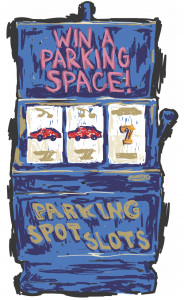
If only waiting in line for two hours to have your pockets reamed out was this much fun.
On Aug. 29, the Sheaf received an email from Michelle Hogan, a student concerned after she went to apply for a parking space and discovered it costs $20 to activate a ballot.
In the email she explains, “I was rather offended by this and checked with the Saskatchewan Liquor and Gaming Authority. It appears that if the university is taking consideration for a chance to win something — even if what I win is a chance to pay for something else — this is a lottery and it needs to be licensed as such. At the present time, as far as I can tell, the U of S is running an illegal lottery with student money.”
According to the university’s website, students applying for a parking pass must have a valid Paws account, be registered in at least one class by Aug. 31 and pay a $20 non-refundable fee to enter an online ballot to the lottery.
On the ballot applicants list the five lots — E, P, U, Y and the stadium parkade — in order of preference.
Ballots are selected at random by a computer, and the draw is held annually on Sept. 1. Once a ballot is chosen the applicant receives a spot in their preferred lot, until all lots are full.
Judy Wall, Parking and Transportation Services manager for the university, estimates this year 2,500 ballots were entered, with roughly 1,800 spots available.
The 700 students whose ballot was not drawn lost their $20, meaning the university raked in $14,000 of students’ cash without providing a parking spot.
The 1,800 students who were allocated a spot paid an additional $155 to $305, depending on location and electrical outlets.
The U of S has been operating the online, ballot-based lottery for student parking since 2005. It has never been authorized by the Saskatchewan Liquor and Gaming Authority.
“Although our [parking] lottery has some aspects that would make it qualify as an official lottery, there were some aspects that did not, therefore [the SLGA was] unable to issue us a license,” said Wall.
The SLGA said they will not authorize the parking lottery because in order to be eligible for a gaming license in Canada, you must be a charitable organization, something the U of S Parking and Transportation Services is not.
After recently speaking with Parking and Transportation Services, Dave Peters, director of licensing and charitable gaming for the SLGA suggested “they should get a legal opinion, as it appears to meet the criteria of what would be constituted as gaming. “
Peters stressed that the SLGA does not give legal advice on what is gaming, or enforce illegal gambling. They simply regulate licensed gambling. It’s up to prosecutors and the police to charge gambling offenders.
“If you’re not a charity or you’re not the government, then you can’t run gambling — not legally,” said Peters. “If they are confident what they are doing is not gaming, then they can run that at their own risk.”
Glen Luther, associate professor at the U of S College of Law and experienced criminal lawyer, said prosecution of the law relating to lotteries is rare, and he doubts anyone will charge the university, but finds it odd they are asking $20 for only a chance at a parking spot.
After flipping through criminal code 206 and 207, he confirmed that what the U of S is doing appears to be a game of chance, and therefore considered a lottery.
“I hesitate to say that the university has any kind of criminal intent, but it seems to me there is a serious issue here as to whether what they are doing is legal. Especially if the SLGA will not license it, and the criminal code does not allow it,” said Luther.
Parking and Transportation manager Wall said the $20 fee was implemented to deter students from applying and not following through with the actual purchase. She cited expenses like snow removal and potholes, and says the majority of all revenue goes back into the lots with a small profit margin.
After contacting Wall a second time to explain why the SLGA would not issue a license and the details of the criminal code, she responded via email.
“The student parking lottery is a fair and easy method for students to apply for parking and we would not like to go back to a first come, first served stand-in-line process or even a time limited phone-in process,” she wrote.
“So with legal advice it is our hope that we can make some changes that would allow us to continue offering this convenient application process and become more compliant with the law.”
—
graphics: Brianna Whitmore/The Sheaf
Leave a Reply